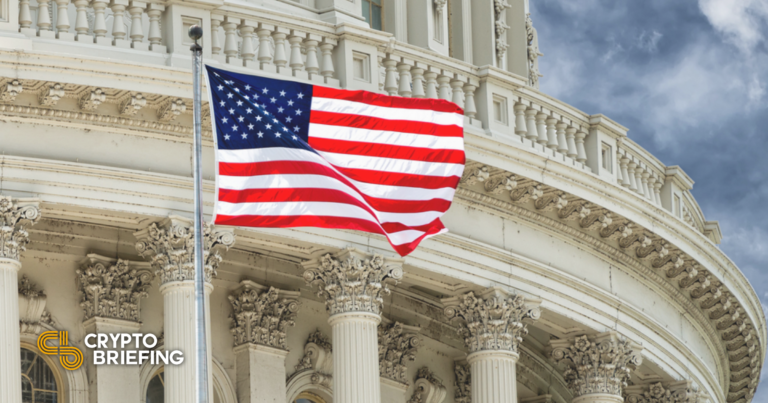
Key Takeaways
As crypto has grown, regulators have become more interested in monitoring the space.
Several U.S. agencies, including the SEC, CFTC, and OCC, are responsible for establishing rules for the crypto sector.
The U.S. Department of the Treasury also plays a key role in assessing how crypto assets should be regulated and contacting policymakers.
Share this article
Agencies like the Securities and Exchange Commission and Commodities Futures Trading Commission play an important role in financial regulation in the United States. In this feature, we explain the country’s key regulatory agencies the impact they have on the crypto space.
Key Crypto Regulators in the U.S.
For as long as crypto has existed, enthusiasts and onlookers alike have pondered how regulators will deal with the asset class. It’s become a more pertinent question as the space has grown and regulators worldwide have made it clear that they are watching the space. In 2021, a boom in the crypto market proved that the technology had gone mainstream. With interest in Bitcoin, DeFi, and stablecoins rising, regulatory agencies are increasingly looking into how to manage the space.
It’s difficult to talk about global cryptocurrency policy without discussing the influence of regulatory agencies in the United States. Over the last decade, several institutions, federal agencies, and bureaus of the U.S. government have been keeping a close eye on the digital assets space. The Securities and Exchange Commission, Commodities Future Trading Commission, Office of the Comptroller of the Currency, Federal Deposit Insurance Corporation, Treasury Department, Federal Reserve, and Financial Crimes Enforcement Network have all made inputs that influenced American crypto policy.
Moreover, some of these agencies have changed their crypto stance since blockchain companies have got into financial services. Many have tried to bring cryptocurrency regulation under the purview of norms created for traditional banking and finance. A comprehensive crypto framework in the U.S. could demand a collaborative effort from all of the key financial regulators. Currently, no single entity is considered the flag-bearer of American crypto policy. However, many of them frequently work together to oversee the developing world of cryptocurrencies.
Securities and Exchange Commission
The Securities and Exchange Commission plays one of the most active roles in U.S. crypto regulation. It was formed in 1934 to prevent fraud connected to the sale of securities or financial contracts.
Simply put, the SEC is tasked with overseeing the securities space. In the context of cryptocurrencies, the SEC takes action against crypto projects that it deems to have raised money illegally. This usually occurs when companies or projects sell tokens that could be deemed as securities to American investors without filing with the SEC or following the appropriate requirements.
Over the years, the SEC has charged several crypto projects, many of which raised money via initial coin offerings. One of the most high-profile cases was the SEC’s legal action against the popular messaging app Telegram. In June 2020, the agency compelled Telegram to return investors $1.2 billion it had raised through a token offering and issued the company an $18.5 million penalty.
In other cases, the SEC charged and eventually settled with EOS and Kin for conducting initial coin offerings that the agency declared unregistered securities sales. In December 2020, it also took the crypto payments firm Ripple to court, alleging that it had illegally profited by selling unregistered securities worth $1.38 billion in the form of XRP tokens. The lawsuit is ongoing.
It is evident from the SEC’s actions that its main focus is determining whether or not a given crypto is a security in order to regulate it. However, there is one more related area where the SEC has influenced the crypto industry. The agency is also responsible for approving crypto-backed trading products such as a Bitcoin exchange-traded fund. In the last quarter of 2021, the agency greenlit the first exchange-traded fund tied to Bitcoin futures contracts. While the approval of a Bitcoin futures ETF was a landmark moment in crypto regulation, the SEC has continued to drag its heels on approving a highly-anticipated spot Bitcoin ETF.
SEC Chair Gary Gensler has also repeatedly issued warnings about DeFi and stablecoins, raising questions about how the agency may look to clamp down on the space in the future.
Commodities Futures Trading Commission
The Commodities Futures Trading Commission is a U.S. government agency that regulates financial derivatives. It enforces rules pertaining to the trading of financial contracts (including futures, options, and swaps) for assets such as commodities, securities, bonds, and cryptocurrencies. In 2015, the CFTC found cryptocurrencies such as Bitcoin to be commodities subject to oversight under its authority. The agency took regulatory oversight of exchanges offering American citizens futures or options contracts on crypto assets like Bitcoin and Ethereum.
Similar to the SEC, the CFTC has taken action against crypto firms it considers to be in violation of derivative asset laws. In October 2020, the CFTC memorably charged BitMEX for illegally offering Bitcoin derivatives trading to U.S. residents. A year later, it led enforcement action against Tether and Bitfinex, charging its parent entity iFinex for offering trading services to U.S. citizens without registration. The CFTC later settled its case with iFinex and issued the firm a $42.5 million penalty.
While the CFTC has full regulatory control over crypto derivatives services offered to U.S. nationals, it rarely weighs in on crypto spot markets. However, CFTC Chair Rostin Behnam has asked Congress for greater authority in crypto oversight and asked for $100 million in additional funding to go toward monitoring the space. It’s evident that the CFTC is aiming to take a more prominent role in crypto regulation; reports have also suggested the agency could join hands with the SEC to oversee crypto regulation in the future.
Office of the Comptroller of the Currency
The Office of the Comptroller of the Currency is the primary regulatory entity supervising the operations of national banks and federal savings associations in the U.S. For cryptocurrencies, the OCC determines how banks can use crypto assets in custody holdings and on balance sheets. The regulator’s first major crypto involvement came from the former Acting Comptroller of the Currency, Brian Brooks, in July 2020. Under his supervision, the OCC issued a guidance letter to U.S. national banks, allowing them to provide custody services, hold stablecoins in their reserves, and even run blockchain nodes.
Federal Deposit Insurance Corporation
While putting dollar-pegged stablecoins to work can earn investors higher interest than traditional saving accounts, stablecoins carry more risk than real dollar deposits due to their lack of government-backed insurance. As such, adequate insurance may be one of the missing links in incorporating stablecoins into the U.S. economy. And that’s where Federal Deposit Insurance Corporation may have a role to play. The FDIC is the regulatory agency responsible for providing insurance for U.S. bank deposits up to $250,000 per depositor. Last year, the FDIC said it was studying deposit insurance for stablecoins.
In January 2022, it was reported that the FDIC was in the process of reviewing insurance coverage for USDF, a stablecoin created by a consortium of U.S. banks, including FirstBank of Nashville, Synovus, New York Community Bank, and Sterling National Bank. FDIC insurance for custodian crypto accounts is a much-needed market solution. Still, it remains to be seen whether FDIC will get aboard the stablecoin bandwagon. The newly-appointed Acting Chair of the FDIC, Martin Gruenberg, said assessing crypto risks was one of the agency’s top priorities for 2022.
Federal Reserve
The Federal Reserve is the United States’ central bank and is responsible for leading the country’s monetary policy. It is the main entity printing the supply of all dollar notes in circulation in the U.S. economy. The organization manages the country’s payments infrastructure and developed an Automated Clearing House system in the 1970s that offers an electronic alternative to paper checks. The Fed’s involvement in crypto regulation is unrelated to any direct policy that may impact the space. However, it is in charge of creating a potential central bank digital currency, an official government-backed digital dollar that’s expected to be integrated into U.S. money payments infrastructure in the coming years.
U.S. Department of the Treasury
While the U.S. Department of the Treasury is not a regulatory agency, it has a crucial role to play in determining how crypto assets will be regulated. That’s because it’s the executive department responsible for managing the federal government’s treasury. One role of the Treasury Department is deliberating with policymakers over the impact of crypto assets on American monetary, economic, and tax policy. On this specific point, Treasury Secretary Janet Yellen has publicly warned about the use of cryptocurrencies for illicit transactions and highlighted the financial risks that stablecoins pose to the U.S. economy.
Regarding specific functions related to crypto, the Treasury Department collects federal taxes through the Internal Revenue Service, a bureau it oversees. Consequently, the Treasury Department’s influence in crypto is largely related to taxation policy and bringing the asset class into the country’s tax code. Per reports, the Treasury Department will implement tax reporting obligations for “cryptocurrency brokers” on all transactions over $10,000, a rule introduced by the bipartisan 2021 Infrastructure Bill.
Furthermore, the Financial Crimes Enforcement Network (FinCEN) is a sub-bureau of the Treasury that keeps track of transactions to prevent money laundering or other violations of the Bank Secrecy Act. Last year, FinCEN issued a penalty to Larry Dean Harmon, the founder of the Bitcoin mixers Helix and Coin Ninja, after they were used to launder funds between 2014 and 2020. Similarly, in August 2021, FinCEN fined the crypto exchange BitMEX for $100 million, citing a lack of anti-money laundering procedures on its Bitcoin derivatives trading platform and violation of the Bank Secrecy Act.
The Future of U.S. Crypto Regulation
After last year’s market rally, there is little doubt that crypto has entered the mainstream. With that, regulators worldwide are paying close attention to the space. Besides Bitcoin, the proliferation of DeFi and stablecoins has also become a hot topic among regulatory agencies. In the U.S., the SEC, CFTC, OCC, FDIC, Federal Reserve, and Treasury Department have all begun to monitor the space and weigh in on crypto policy. As digital assets continue to grow, it’s likely that U.S. agencies will take a more active role in regulating the space.
Share this article
The information on or accessed through this website is obtained from independent sources we believe to be accurate and reliable, but Decentral Media, Inc. makes no representation or warranty as to the timeliness, completeness, or accuracy of any information on or accessed through this website. Decentral Media, Inc. is not an investment advisor. We do not give personalized investment advice or other financial advice. The information on this website is subject to change without notice. Some or all of the information on this website may become outdated, or it may be or become incomplete or inaccurate. We may, but are not obligated to, update any outdated, incomplete, or inaccurate information.
You should never make an investment decision on an ICO, IEO, or other investment based on the information on this website, and you should never interpret or otherwise rely on any of the information on this website as investment advice. We strongly recommend that you consult a licensed investment advisor or other qualified financial professional if you are seeking investment advice on an ICO, IEO, or other investment. We do not accept compensation in any form for analyzing or reporting on any ICO, IEO, cryptocurrency, currency, tokenized sales, securities, or commodities.
See full terms and conditions.
$322 Million: How The SEC Should Settle With Ripple Labs Over XRP
The U.S. Securities and Exchange Commission handed down a $24 million slap on the wrist to Block.one for allegedly selling unregistered securities in its $4 billion ICO, begging the question:…
NFT Express: Your on-ramp to the world of NFTs
At Tatum, we’ve already made it super easy to create your own NFTs on multiple blockchains without having to learn Solidity or create your own smart contracts. Anyone can deploy…
CFTC And Its Jurisdiction Over Cryptocurrencies
It was in 2015 that the US Commodity Futures Trading Commission (CFTC) first put its foot down on the unregistered bitcoin options trading platform Coinflip Inc. This event stirred up…
U.S. Regulators to Outline Crypto Rules for Banks: Statement
The sprint team of U.S. regulators will define the rules for banks in the next year. U.S. Regulators to Define Banks’ Crypto Roles U.S. banking regulators will unite to define…
















